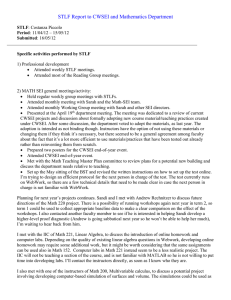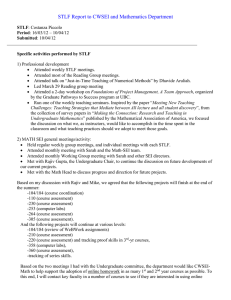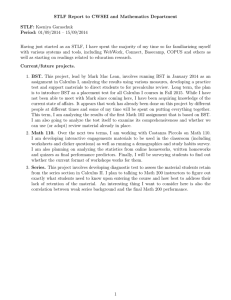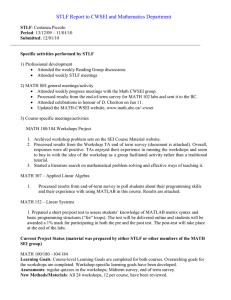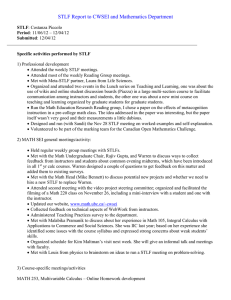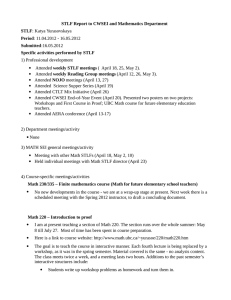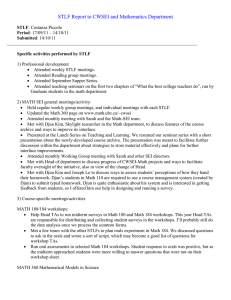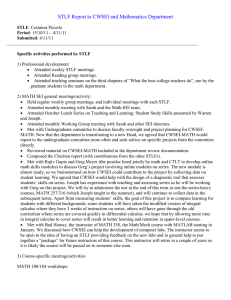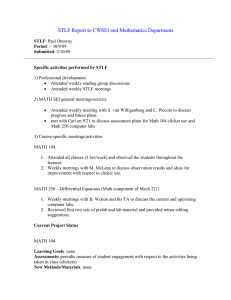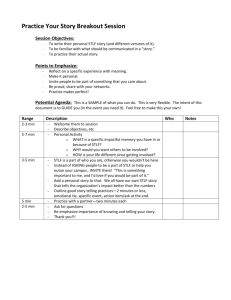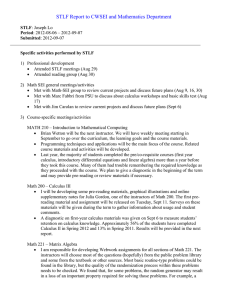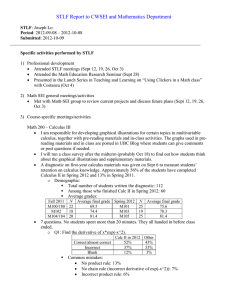STLF Report to CWSEI and Mathematics Department
advertisement
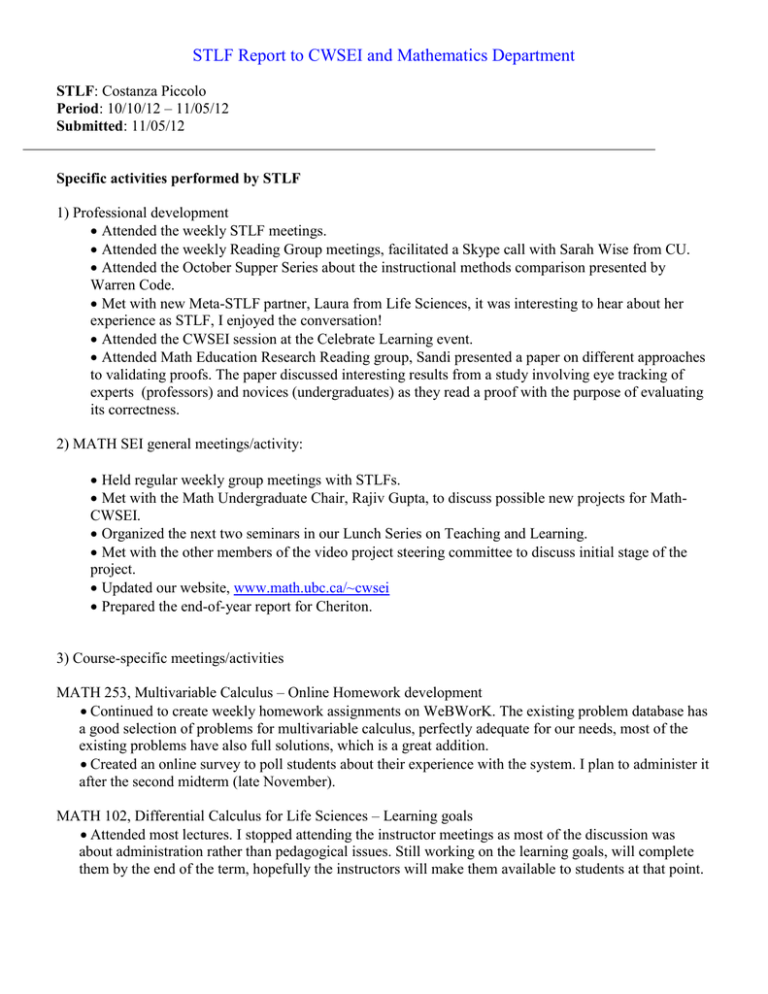
STLF Report to CWSEI and Mathematics Department STLF: Costanza Piccolo Period: 10/10/12 – 11/05/12 Submitted: 11/05/12 Specific activities performed by STLF 1) Professional development Attended the weekly STLF meetings. Attended the weekly Reading Group meetings, facilitated a Skype call with Sarah Wise from CU. Attended the October Supper Series about the instructional methods comparison presented by Warren Code. Met with new Meta-STLF partner, Laura from Life Sciences, it was interesting to hear about her experience as STLF, I enjoyed the conversation! Attended the CWSEI session at the Celebrate Learning event. Attended Math Education Research Reading group, Sandi presented a paper on different approaches to validating proofs. The paper discussed interesting results from a study involving eye tracking of experts (professors) and novices (undergraduates) as they read a proof with the purpose of evaluating its correctness. 2) MATH SEI general meetings/activity: Held regular weekly group meetings with STLFs. Met with the Math Undergraduate Chair, Rajiv Gupta, to discuss possible new projects for MathCWSEI. Organized the next two seminars in our Lunch Series on Teaching and Learning. Met with the other members of the video project steering committee to discuss initial stage of the project. Updated our website, www.math.ubc.ca/~cwsei Prepared the end-of-year report for Cheriton. 3) Course-specific meetings/activities MATH 253, Multivariable Calculus – Online Homework development Continued to create weekly homework assignments on WeBWorK. The existing problem database has a good selection of problems for multivariable calculus, perfectly adequate for our needs, most of the existing problems have also full solutions, which is a great addition. Created an online survey to poll students about their experience with the system. I plan to administer it after the second midterm (late November). MATH 102, Differential Calculus for Life Sciences – Learning goals Attended most lectures. I stopped attending the instructor meetings as most of the discussion was about administration rather than pedagogical issues. Still working on the learning goals, will complete them by the end of the term, hopefully the instructors will make them available to students at that point. MATH 100/180, Differential Calculus for Engineering and Physical Sciences Met with the Math 180/184 workshops Head TA. He administered the usual midterm survey on Scantron forms and I helped him process the forms and interpret the results. The results from Math 180 are extremely stable over the years, students respond positively to all questions and the variability from year to year is minimal. Results in Math 184 are subjects to more fluctuations. In the past, I thought this was due to poor alignment with the rest of the course, but now, after so many iterations, I’m not so sure if that is a correct interpretation. Math 184 may just be more inclined to whining about Math than Math 180 students and for some reason some years are worse than others. The 2010 data from MAPS would in fact support this impression, as the Math 184 students seemed to be less “expert-like” than Math 180 students, but it could be a combination of many factors (less motivation, weaker skills, etc). Edited the list of learning goals to reflect a recent change in the course syllabus. 4) Other projects Instructional Methods Comparison Experiment Recoded the related rates question from the final exam (involving a conical tank draining into a cylindrical one). In my previous coding, I hadn’t been thoroughly consistent in the way I coded how students interpreted the relationship between the tanks (rate of draining of conical tank = rate of filling of cylinder, in absolute values) and when I analysed the data it looked like the experimental section was worse at making that connection. After recoding consistently, we observed no differences between experimental and control section. Analysed student work to identify the sources of most common errors in solutions to the related rates question on the final exam. For example, over 30% of the class failed to interpret the rate given in the problem correctly (the problem gave the rate at which the water level goes down in one tank, and asked for the rate at which the water level rises in the other tank), 7-10% of the students consistently interpreted it as the rate of water draining (ie rate of change of volume) rather than rate of water level dropping, even though the problem explicitly stated “the water level decreases at a rate of blah”, the rest Analysis of students’ understanding of Related Rates problems in think aloud interviews Listened to the recordings of all the 11 interviews we ran in March with 1st yr students. Students were asked to solve a number of related rates problems, including the same problem they did on the final exam earlier in December. Some of the students in the interviews made similar errors to the ones I observed on exams, so a thorough analysis of the student thinking during the interview will hopefully help me shed some light on the source of the misconceptions. I’ll summarize these findings in my next report. Study Skills Intervention Designed and run (with Sandy) the study skills workshop with students from Math 102, more details in Sandi’s report. Preparing this workshop gave me the opportunity to look for resources on study tips in math and think about activities students can do at home to learn better. I’m particularly happy with one of the activities we designed for the workshop where we gave the students a worked-out example and asked them justify specific steps in the solution. I think this type of activity should occur more often in our courses. Future plans MATH 253 Continue to create weekly assignments on Webwork Administer end-of-term survey and analyse results MATH 102 Complete the list of learning goals Design and administer an end-of-term survey to collect data on students’ perceptions of the labs (this course has biweekly computer labs that have been improved by the instructor this term) Classroom technologies Improve the department webpage on Teaching Resources: add a section on clickers, update the page about MATLAB with all the resources created by CWSEI-Math in the past, update the page about webwork Contact Pan Luo from CTLT to discuss possible improvements of WeBWorK. Research project Complete the coding of student work for the second topic for the instructional methods comparison experiment Plan how to code the interviews more in details and
